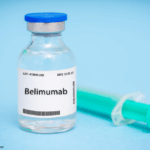 Lupus nephritis is one of the leading causes of mortality for patients with systemic lupus erythematosus (SLE), and patients with both SLE and end-stage renal disease have standardized mortality ratios more than 60 times that of patients with SLE with normal kidney function.1 Lupus nephritis causes irreversible kidney damage and is associated with renal failure, cardiac events and death.2 Treatment is aimed at reducing symptoms, keeping the disease from getting worse and avoiding the disease from getting worse and avoiding the need for dialysis or a kidney transplant.
Lupus nephritis is one of the leading causes of mortality for patients with systemic lupus erythematosus (SLE), and patients with both SLE and end-stage renal disease have standardized mortality ratios more than 60 times that of patients with SLE with normal kidney function.1 Lupus nephritis causes irreversible kidney damage and is associated with renal failure, cardiac events and death.2 Treatment is aimed at reducing symptoms, keeping the disease from getting worse and avoiding the disease from getting worse and avoiding the need for dialysis or a kidney transplant.
The good news: Rheumatologists now have not one, but two approved options to treat patients with active lupus nephritis.
Belimumab Approved
In late December 2020, the U.S. Food & Drug Administration (FDA) approved belimumab (Benlysta) to treat adults with active lupus nephritis who are receiving standard therapy. This approval is for both the intravenous and subcutaneous formulations. Belimumab, which was approved by the FDA to treat SLE in March 2011, is now the first agent approved to treat both SLE and active lupus nephritis in adults.3
This approval addresses an unmet need for lupus nephritis patients and is the result of an FDA breakthrough therapy designation and priority review of findings from the BLISS-LN study.4
Background: BLISS-LN was a phase 3 study conducted in patients with active lupus nephritis (N=448). This randomized, double-blind, placebo-controlled, post-approval commitment study evaluated the efficacy and safety of intravenous belimumab (10 mg/kg dose) and standard therapy (i.e., mycophenolate mofetil for remission induction and remission maintenance, or cyclophosphamide for remission induction followed by azathioprine for remission maintenance, and steroids) compared with placebo and standard therapy in this patient population.
The study’s primary end point was a statistically significant greater number of patients with lupus nephritis taking belimumab and standard therapy achieving a primary efficacy renal response at year 2 (week 104) than patients taking placebo and standard therapy (43% vs. 32%; odds ratio: 95% confidence interval [CI] 1.55 (1.04, 2.32), P=0.0311). Additionally, all four major secondary end points, including complete renal response and time to renal-related events or death, achieved statistical significance. No new safety signals were reported.
BLISS-LN showed that belimumab with standard therapy significantly improves the signs and symptoms of lupus nephritis, and patients had a 49% decrease in the risk of experiencing a renal-related event.
The good news: Rheumatologists now have not one, but two approved options to treat patients with active lupus nephritis.


